I am ready to beat 2015 with a hammer and send it out into the streets, bleeding and bewildered, for the village hounds to devour. When, in future years, I look back upon these twelve months, I will remember seeing greedy cliques of aspirant one-percenters sending good people from their good jobs into professional exiles of uncertain length and depth. I will remember mass shootings and Paris and the ever-increasing volume of demagogues spewing vile, xenophobic blather, and having their pseudo-intellectual retchings lapped up by masses of pale, sweaty dullards grown ever more fearful of damn near everything. I will remember how disease, decay and death visited my own family, and I will remember watching helplessly as the rot claimed my hero, as he lay in the very living room that was for three decades the setting for every innocuous, joyful thing I can think of—from Christmases to movie viewings to makeout sessions to long conversations (and laughter—so much laughter). I will remember waking in the middle of the night, my head seized with anxiety, unable to get back to sleep, and I will remember this happening for months. I will remember days when the only valid response to any of these things was to give in to the overwhelming miserable weight of it all, and hope no one would find me in that state, puffy-eyed and hurting.
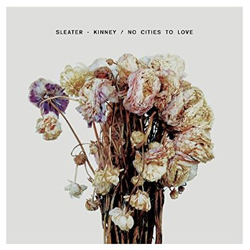 I look to music for respite and catharsis, this year in equal measure, and I am grateful for the sounds that provided both for me as time and circumstance did their thing. I’d like to tell you about some of these sounds now.
I look to music for respite and catharsis, this year in equal measure, and I am grateful for the sounds that provided both for me as time and circumstance did their thing. I’d like to tell you about some of these sounds now.
First, Sleater-Kinney. The prospect of new music from them was unthinkable for a number of years, but I was so happy when No Cities to Love dropped back in January—it’s frenetic, melodic and wholly engaging. I love the Eighties flashback riffage of ”Fangless” and the frantic punk-pop (and smashing chorus) of ”A New Wave,” not to mention the kick-drum-heavy stomp of ”Gimme Love.” The record gave me a cool blast of joyful noise whenever I needed it.
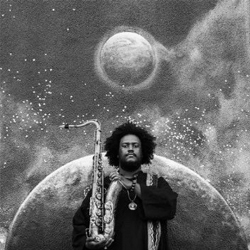 I’ve always been fond of artists who make studio double albums. I love the chutzpah and ambition of artists whose muse cannot be contained on two sides of wax; they simply must have two extra sides on which to share their reflections, meditations and reveries. Tenor saxophonist Kamasi Washington has ambition to spare, and it all comes streaming out in The Epic, a three-LP set that veers between little-big-band intimacy and string- and choir-assisted sweep, sometimes in the same song (”The Magnificent 7″). I hear the expected Coltrane, Wayne Shorter and Cannonball Adderly influences, but I also get a wallop of electric Miles here and there. There’s a track with an unstoppable groove (”Re Run Home”) and, on ”The Rhythm Changes,” the heavenly voice of Patrice Quinn, leading us through the song’s truths and proclamations. I’ve been playing The Epic for months, and I still haven’t gotten to the bottom of it.
I’ve always been fond of artists who make studio double albums. I love the chutzpah and ambition of artists whose muse cannot be contained on two sides of wax; they simply must have two extra sides on which to share their reflections, meditations and reveries. Tenor saxophonist Kamasi Washington has ambition to spare, and it all comes streaming out in The Epic, a three-LP set that veers between little-big-band intimacy and string- and choir-assisted sweep, sometimes in the same song (”The Magnificent 7″). I hear the expected Coltrane, Wayne Shorter and Cannonball Adderly influences, but I also get a wallop of electric Miles here and there. There’s a track with an unstoppable groove (”Re Run Home”) and, on ”The Rhythm Changes,” the heavenly voice of Patrice Quinn, leading us through the song’s truths and proclamations. I’ve been playing The Epic for months, and I still haven’t gotten to the bottom of it.
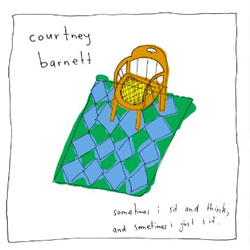 One of the great radio moments of the year for me was hearing Courtney Barnett’s heavily accented voice sing, ”Give me all your money, and I’ll make some origami, honey!” I laughed out loud, not because it was particularly funny, but because of how the line was delivered—the offhanded snottiness of it, balanced with the expectation that yes, you are absolutely going to give me all the cash in your wallet, and I’ll turn it into swans and pterodactyls, and you’ll be happy to watch me do it. Barnett’s delivery hearkens back to Chrissie Hynde and Debbie Harry and Kim Gordon, but the punky poetry on Sometimes I Sit and Think, and Sometimes I Just Sit is all her own, and very refreshing, particularly on ”Dead Fox,” ”Aqua Profunda!” and ”Pedestrian at Best” (from which the ”origami” line comes), even the languid, slightly-too-long ”Small Poppies.” Can’t wait to hear what she comes up with next.
One of the great radio moments of the year for me was hearing Courtney Barnett’s heavily accented voice sing, ”Give me all your money, and I’ll make some origami, honey!” I laughed out loud, not because it was particularly funny, but because of how the line was delivered—the offhanded snottiness of it, balanced with the expectation that yes, you are absolutely going to give me all the cash in your wallet, and I’ll turn it into swans and pterodactyls, and you’ll be happy to watch me do it. Barnett’s delivery hearkens back to Chrissie Hynde and Debbie Harry and Kim Gordon, but the punky poetry on Sometimes I Sit and Think, and Sometimes I Just Sit is all her own, and very refreshing, particularly on ”Dead Fox,” ”Aqua Profunda!” and ”Pedestrian at Best” (from which the ”origami” line comes), even the languid, slightly-too-long ”Small Poppies.” Can’t wait to hear what she comes up with next.
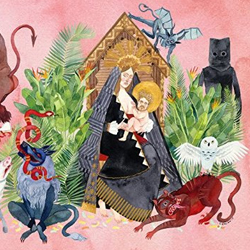 Josh Tillman’s first record as Father John Misty immediately connected with me (it was my favorite album of 2012); I Love You Honeybear did not. I thought Tillman’s surreal humor fell flat, which probably says more about my own mood than the quality of the lyrics. What won me over, though, was the music—great big melodies perfectly played, both sweeping gestures and quieter passages. The album grew on me, and my impression of it changed considerably as the year wore on. Funny enough, though, his big hit of the year wasn’t even on the album—it was a cover of Arcade Fire’s ”The Suburbs” that went viral over the summer. Even that didn’t move me as much as his AV Club rendition of Flaming Lips’ ”Do You Realize” from a couple years back. I listened to that a lot, and I’ll be listening for Tillman whenever he sees fit to release new material.
Josh Tillman’s first record as Father John Misty immediately connected with me (it was my favorite album of 2012); I Love You Honeybear did not. I thought Tillman’s surreal humor fell flat, which probably says more about my own mood than the quality of the lyrics. What won me over, though, was the music—great big melodies perfectly played, both sweeping gestures and quieter passages. The album grew on me, and my impression of it changed considerably as the year wore on. Funny enough, though, his big hit of the year wasn’t even on the album—it was a cover of Arcade Fire’s ”The Suburbs” that went viral over the summer. Even that didn’t move me as much as his AV Club rendition of Flaming Lips’ ”Do You Realize” from a couple years back. I listened to that a lot, and I’ll be listening for Tillman whenever he sees fit to release new material.
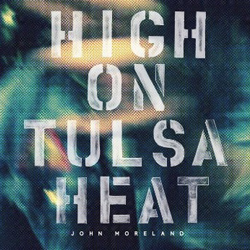 John Moreland toured this year with Dawes, Patty Griffin and Jason Isbell, and his album High on Tulsa Heat proves that he belongs in that vaunted company. Whether dropping spooky, quiet verses with just his voice and acoustic guitar, or leading a group of country rock players perfectly attuned to his songs’ needs, Moreland performs with soul and conviction, and should be on the cusp of wider acclaim. The heartbreaking ”Cherokee” got a video made for it, but cuts like ”Heart’s Too Heavy,” ”American Flags in Black and White,” and the album-opening ”Hang Me in the Tulsa County Stars” deserve attention, as well. The whole damn thing does, really; it’s one of those albums that I imagine will come back at me for a long time.
John Moreland toured this year with Dawes, Patty Griffin and Jason Isbell, and his album High on Tulsa Heat proves that he belongs in that vaunted company. Whether dropping spooky, quiet verses with just his voice and acoustic guitar, or leading a group of country rock players perfectly attuned to his songs’ needs, Moreland performs with soul and conviction, and should be on the cusp of wider acclaim. The heartbreaking ”Cherokee” got a video made for it, but cuts like ”Heart’s Too Heavy,” ”American Flags in Black and White,” and the album-opening ”Hang Me in the Tulsa County Stars” deserve attention, as well. The whole damn thing does, really; it’s one of those albums that I imagine will come back at me for a long time.
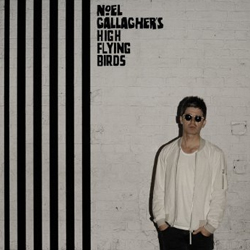 My favorite singles this year were straight-up highway songs—things that sounded best in the car, played loud while signs and mile markers faded in the distance behind me. Florence + the Machine probably scored highest with me in that regard—”Ship to Wreck” was typically dramatic and emotive, and the song just moved. Noel Gallagher’s ”In the Heat of the Moment” and ”Ballad of the Mighty I” were close behind; both hit with the muscular force that marked the best Oasis material, making the perfect soundtrack for lots of highway motion. The rest of Chasing Yesterday (his album with his High Flying Birds) has that retro-nouveau air that is typical of Gallagher’s work—one vacillates between asking ”Where have I heard that before?” and just enjoying it all for the terrific rock music that it is.
My favorite singles this year were straight-up highway songs—things that sounded best in the car, played loud while signs and mile markers faded in the distance behind me. Florence + the Machine probably scored highest with me in that regard—”Ship to Wreck” was typically dramatic and emotive, and the song just moved. Noel Gallagher’s ”In the Heat of the Moment” and ”Ballad of the Mighty I” were close behind; both hit with the muscular force that marked the best Oasis material, making the perfect soundtrack for lots of highway motion. The rest of Chasing Yesterday (his album with his High Flying Birds) has that retro-nouveau air that is typical of Gallagher’s work—one vacillates between asking ”Where have I heard that before?” and just enjoying it all for the terrific rock music that it is.
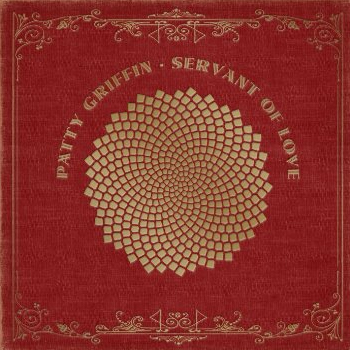 The title track of Patty Griffin’s Servant of Love starts the record on a jarring note. Here is Griffin in an expansive, expressive mode, accompanied by a spare piano and a simple meditation: ”I long to live by the ocean / Carry me away / I’m a servant of love.” The listener is carried along with her, skimming the surface of some vast and dark body of water, toward an uncertain horizon. By the time Ephraim Owens’ trumpet enters the songscape, Griffin’s voice is itself expanding, doing things we’re not used to hearing it do. The best comparison I can think of is the reaction I have to hearing Nina Simone singing ”Wild is the Wind”—it’s sensuous and spooky, at the same time.
The title track of Patty Griffin’s Servant of Love starts the record on a jarring note. Here is Griffin in an expansive, expressive mode, accompanied by a spare piano and a simple meditation: ”I long to live by the ocean / Carry me away / I’m a servant of love.” The listener is carried along with her, skimming the surface of some vast and dark body of water, toward an uncertain horizon. By the time Ephraim Owens’ trumpet enters the songscape, Griffin’s voice is itself expanding, doing things we’re not used to hearing it do. The best comparison I can think of is the reaction I have to hearing Nina Simone singing ”Wild is the Wind”—it’s sensuous and spooky, at the same time.
Servant of Love dips deeply into a well of sadness, yet it is, in the end, a positive record. Griffin uses the blues as a vehicle for that positivity (most notably on ”Hurt a Little While”), and mines her unique powers as a songwriter to set overwhelming truths in simple, human terms (”Made of the Sun,” ”Shine a Different Way”). I have shed tears while listening to this music, as I have with certain of her songs in the past, but never before have her words resonated so deeply with me. I am now, as ever, in her thrall.
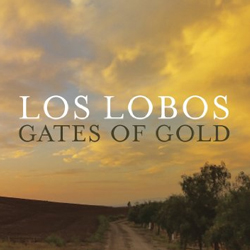 Los Lobos’ Gates of Gold is as unexpectedly welcome a pleasure as Tom Petty’s Hypnotic Eye was last year, as compelling a set of songs as The Wolves have turned in since This Time, back in ’99. The familiar shifts are here, between the David Hidalgo/Louie Perez songs and Cesar Rosas’ tunes, and the funky production tweaks and sonic acrylics and gouaches that have been part of the band’s studio palate since Kiko are present, as well. What really makes a difference in the presentation of the songs is the drums, courtesy David Hidalgo, Jr. (currently a member of Social Distortion), who brings delightfully heavy-footed timekeeping to the garage rock of ”Mis-Treater Boogie Blues” and the Hendrixian ”Too Small Heart,” as well as a steady presence to slower songs like ”Made to Break Your Heart” and the album-closing ”Magdalena.”
Los Lobos’ Gates of Gold is as unexpectedly welcome a pleasure as Tom Petty’s Hypnotic Eye was last year, as compelling a set of songs as The Wolves have turned in since This Time, back in ’99. The familiar shifts are here, between the David Hidalgo/Louie Perez songs and Cesar Rosas’ tunes, and the funky production tweaks and sonic acrylics and gouaches that have been part of the band’s studio palate since Kiko are present, as well. What really makes a difference in the presentation of the songs is the drums, courtesy David Hidalgo, Jr. (currently a member of Social Distortion), who brings delightfully heavy-footed timekeeping to the garage rock of ”Mis-Treater Boogie Blues” and the Hendrixian ”Too Small Heart,” as well as a steady presence to slower songs like ”Made to Break Your Heart” and the album-closing ”Magdalena.”
 The skepticism that greeted news of a Bob Dylan album of Sinatra covers was, to my mind, completely justified. The grizzled, croaky-voiced pirate of Tempest, Together Through Life and Modern Times and a hundred or so shows a year was going to tackle the same material sung definitively by probably the greatest crooner ever to approach the mic in front of a swingin’ orchestra? Riiiiiight.
The skepticism that greeted news of a Bob Dylan album of Sinatra covers was, to my mind, completely justified. The grizzled, croaky-voiced pirate of Tempest, Together Through Life and Modern Times and a hundred or so shows a year was going to tackle the same material sung definitively by probably the greatest crooner ever to approach the mic in front of a swingin’ orchestra? Riiiiiight.
How silly we were to doubt him. With one of the most skilled, versatile bands on the planet backing him, Dylan does for ”Autumn Leaves” and ”Some Enchanted Evening” on Shadows in the Night what he did for the folk and blues standards on World Gone Wrong and Good as I Been to You—not so much transform the songs, but create the settings and employ his voice in such a manner that the songs seem suited specifically for him, and he them. It’s more than a comfortable fit.
The voice is the first thing to hit you, right in the first song, ”I’m a Fool to Want You.” When he sings the second line of the first verse is the moment when you sense that this could work, that maybe for 35 or so minutes, you can set Sinatra’s considerable contributions aside and hear Dylan treat these Great American Songbook standards with restraint and respect. You can sense that respect in ”Where Are You?” as he takes on Harold Adamson and Jimmy McHugh’s saloon poetry as if the song had been written for him all along, and listening to him breaks your heart just as his woman is breaking his. The truly transcendent moment is ”Stay with Me,” where he spends a few minutes talking to God Himself, asking for redemption, hoping for it, but expecting nothing. I expected very little from Shadows in the Night, and I regret my lack of faith, even as I enjoy the rewards of repeated spins through it.
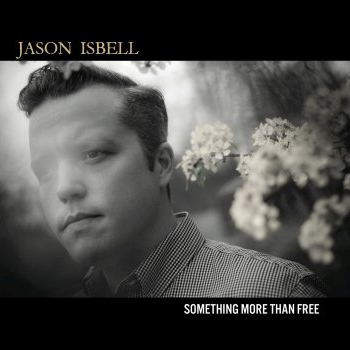 The shadow cast by Jason Isbell’s 2013 record Southeastern (as definitive an instant classic as I’ve heard in 15 or more years) is long and deep, indeed, and anything the man released as a follow-up was bound to hit the allegorical Wall of Unfair Comparison. And while not everything on Something More than Free can stand with Isbell’s earlier high-water mark, ”24 Frames,” ”Speed Trap Town,” and ”Hudson Commodore” certainly do, and ”Children of Children” and the title track probably hit that mark, too. The 400 Unit are a damn fine band, playing country rock of a very high order, and Isbell once again proves himself to be as fine a singer and guitar player as he is a songwriter. I understand the dissatisfaction some have expressed with the record; I respectfully disagree.
The shadow cast by Jason Isbell’s 2013 record Southeastern (as definitive an instant classic as I’ve heard in 15 or more years) is long and deep, indeed, and anything the man released as a follow-up was bound to hit the allegorical Wall of Unfair Comparison. And while not everything on Something More than Free can stand with Isbell’s earlier high-water mark, ”24 Frames,” ”Speed Trap Town,” and ”Hudson Commodore” certainly do, and ”Children of Children” and the title track probably hit that mark, too. The 400 Unit are a damn fine band, playing country rock of a very high order, and Isbell once again proves himself to be as fine a singer and guitar player as he is a songwriter. I understand the dissatisfaction some have expressed with the record; I respectfully disagree.
But, I admit, my perception is likely skewed. Something More than Free was released in mid-July, but a copy leaked online two months before that, in mid-May, just as my cancer-sick father was staging his last stand. In those two months, when I was able to listen to anything, I listened this record. When I drop the needle on the copy I keep at home, I am transported back to a hospital room, late at night; sometimes I see a daybed in a rearranged living room; I see family gathered around a withered man; he’s staring at the ceiling, beckoned by seraphs only he can see; I see another family gathering, a burial on a beautiful, sunny, warm day. I see roads stretched out in front of me—twenty, fifty, a hundred miles of them at a shot—and I drive on them, mostly in daylight, craving motion; needing it like I need air.
I kept going back to ”Speed Trap Town.” It’s about a guy who just realizes that there’s nothing keeping him in his dinky hometown—his woman just left him and he’s considering either drinking himself into oblivion at a high school football game, or getting into his car and splitting for good. The last thing tethering him in place is his old man, who is apparently a son of a bitch, but who’s been in the ICU for a long time. The last verse about him goes like this:
But it never did occur to me to leave, til tonight
When I realized he’ll never be all right
Sign my name and say my last goodbye and decide
If there’s nothing here that can’t be left behind
The recognition that things will never get better leads to action—”Sign my name and say my last goodbye …” And those lines would crush me every time. Every time. I kept listening to that song, over and over, waiting for the time when I’d play it and not respond. The little catharses happened for a couple months. Eventually, they stopped.
But I’m grateful to have had them, to have engaged with art that brought them out of me, that melded with my circumstances, that sent tendrils deep into whatever it was that kept me sentient and responsive all spring and summer. I’m grateful for the voice that delivered that art, grateful for all the voices I’ve heard and loved, from Isbell to John Moreland to Patty Griffin; grateful for Sleater-Kinney’s energy, for Kamasi Washington’s vision, for Bob Dylan’s taste and wisdom. These were all necessary things to have had in my head and heart this year.
And I admit to approaching 2016 with more than a little trepidation—no forward-looking toasts for me this year, thanks. But if there is music, I will have strength; it has seen me through the saddest of days, and I cannot imagine meeting whatever lies ahead without it.
Selah.





Comments